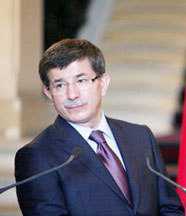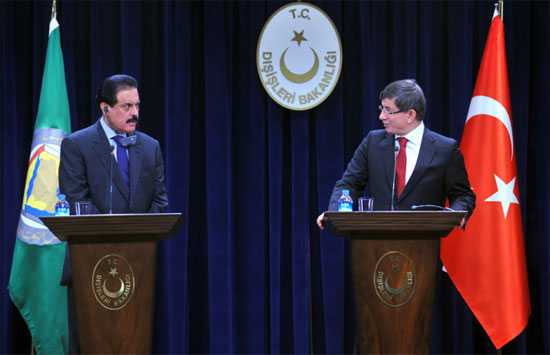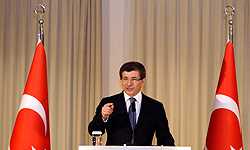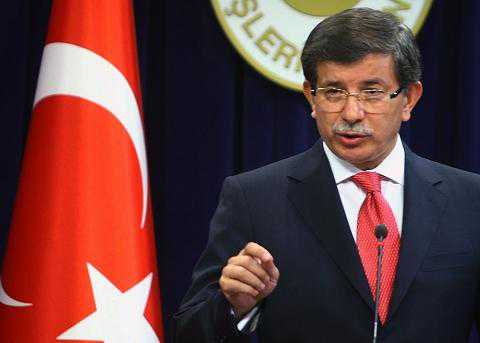Turkey’s bid for global actorhood: Davutoğlu’s new foreign policy lexicon
| The Turkish Foreign Ministry just held the third annual gathering of its ambassadors serving worldwide. This year’s meeting, organized under the theme “Visionary Diplomacy: Global and Regional Order from Turkey’s Perspective,” was kicked off with a conference in Ankara on Jan. 3. | |
| The most remarkable part of the conference was Foreign Minister Ahmet Davutoğlu’s opening address, in which he offered a first-hand evaluation of his vision of Turkey’s place in the world.
The activism of late observed in Turkey’s foreign relations is largely attributed to Davutoğlu, an academic by profession who emerged as the architect of Turkish foreign policy under the incumbent Justice and Development Party (AK Party) since its coming to power in 2002. Although Davutoğlu already played the lead role in the redefinition of Ankara’s external relations during his tenure as chief advisor to the prime minister on foreign policy issues between 2002 and 2009, his imprint on the making of Turkish foreign policy became particularly visible following his appointment as foreign minister in May 2009. Since then, Davutoğlu has embarked on a comprehensive project to restructure the Turkish diplomatic service so that it can live up to the requirements of the diplomatic activism he has been advocating. In his address at the conference, as well as in the interviews he gave to the Turkish press in the last few days of 2010, Davutoğlu outlined a proactive foreign policy vision, underscoring Turkey’s determination to be reckoned with as a major player in regional and global affairs. Moreover, he offered a defense of Ankara’s new foreign policy direction, and countered the arguments of those circles in the West and inside the country who maintain that Turkey has been “shifting its axis.” Davutoğlu’s presentation at the conference, though reiterating many of his earlier arguments, conveyed them in a systematic manner, providing a good reference for those seeking to understand the new Turkish foreign policy lexicon. Turkey’s place in the international order Perhaps one of the most conspicuous aspects of Davutoğlu’s discourse is a deliberate effort to initiate a debate on the structure of the international order and situate Turkey’s international positioning within this broader context. As a matter of fact, on many occasions, the critique of the international order has been taken up by President Abdullah Gül and Prime Minister Recep Tayyip Erdoğan. Turkish leaders increasingly question the legitimacy of the current international system, on economic, political and, more importantly, moral grounds. They have expressed their unease with the injustice and inequality taking place in the international order based on the post-World War II geopolitical reality, in an effort to make a case that it is in need of redefinition. They have been calling for the reform of international organizations, including the United Nations and global financial institutions, and arguing that the West and the United States should share power and responsibility with other actors. In a related move, Davutoğlu assigns Turkey a leading role in the redefinition of the global order. Indeed, this is where Davutoğlu offers an added rationale for foreign policy activism. In his view, Turkey cannot remain complacent in a world that is in flux. Turkey can no longer be a reactive actor that takes for granted the established international order created by major powers. On the contrary, at a time during which debate on the basic institutions and principles of the international system is under way, Turkey should be “among the countries that will lay the foundations of this order.” In his usual way of using metaphors to make his point, Davutoğlu wants Turkey to become one of the “city planners” that pursues a dynamic foreign policy agenda and takes an active role in the formulation of a new institutional architecture for world politics. More importantly, Davutoğlu’s vision for Turkey’s role in the international arena has strong moral and idealistic undertones. He sees Turkey actively contributing to the emerging global culture, helping bridge civilizational differences. Similarly, he believes Turkey can make a unique contribution in the redefinition of the world order, as it can act as a “wise country,” i.e., one that can foresee potential crises and develop preventive measures and one whose opinion is taken seriously by other countries. As a wise country of humanity, Davutoğlu wants Turkey to conduct its foreign policy on the basis of respected universal principles, stand up for its values, and act as the voice of human conscience. In this regard, for instance, Turkey increasingly focuses on the issue of underdevelopment and socioeconomic injustice. In addition to many initiatives Turkey has undertaken in Africa, it will also host the UN summit on the Least Developed Countries later this year. This new lexicon with global references, being developed by Davutoğlu, departs from the parameters of conventional Turkish foreign policy. While its foreign policy priorities were geared largely towards the territorial defense of the country and the protection of Turkey’s interests in various bilateral disputes with neighbors, Turkey has moved past this mentality. In the post-Cold War era, Turkey has been increasingly engaged in the diplomatic affairs of its surrounding regions. A large part of Davutoğlu’s vision and proactive agenda builds on this legacy. However, Davutoğlu seeks to move beyond this regional focus and to assert a role for Turkey on the global level. He does not hide dissatisfaction with Turkey’s current standing in global politics, arguing that “we have to make it known that we find the roles assigned to us and the dresses designed for us unsatisfactory.” A current mismatch of objectives Such an ambitious discourse critical of the global order has been voiced in world history by many rising powers that are unsatisfied with the existing status quo. Such calls are usually precipitated by power shifts in the global system, which transform the existing balance of power. Davutoğlu’s vision definitely has a material basis to build on. Given the country’s expanding economic power, wealth and geopolitical clout, Turkey’s relative material power is on the rise. Thus, many Turks want their country to play a larger role than in the past. Nonetheless, realizing Turkey’s objective of reconfiguring the global order is likely to face many challenges; not the least, the question of having sufficient resources and a suitable political environment to sustain multifaceted global commitments. Similarly, there is an obvious mismatch between the objectives Davutoğlu set for Turkey and the country’s current reality. For instance, despite his vision of advocating the cause of less developed countries, Turkey itself still ranks 83rd in the United Nations’ human development index. When confronted with those questions, Davutoğlu maintains, “We have a right to it, we have experience to do it and we are capable of doing it.” Moreover, for Davutoğlu, global leadership is a matter of perception, as much as having the necessary material resources. He believes that if Turks can overcome “the inferiority complex” and move beyond a “torn identity,” as argued by Samuel Huntington, they will emerge self-confident and better able to take part in global processes. True it may be, however, power and material capabilities will remain an essential variable in international relations. 2011 will be a major test for Davutoğlu’s ability to blend Turkey’s resources and historical experience to make a rightful bid for global actorhood. *Şaban Kardaş is an assistant professor of international relations at TOBB — Economy and Technology University and the assistant editor of Insight Turkey.
|






